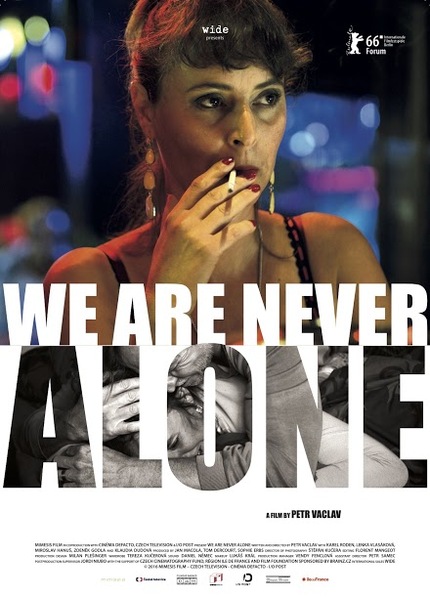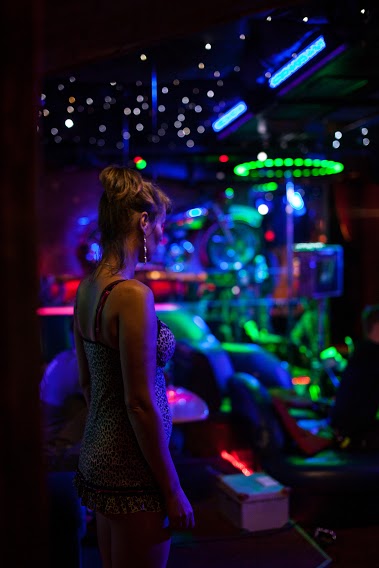Berlinale 2016 Review: WE ARE NEVER ALONE Delivers A Powerful, Harrowing And Way Too Vivid Parable

Petr Václav, the Czech filmmaker living and working in France, returns to the theme of racial discrimination already addressed in his feature debut Marian (1996). Prejudice based on race persists as a hot topic in the Czech Republic, attracting ever more attention as the government rests idle. In The Way Out (2014) Václav focuses on one decent Roma family struggling to make ends meet, plunging into the Roma community in docudrama fashion.
Václav's earlier effort The Way Out was an unbiased and humanistic look at wide-spread problems within the Roma community, such as youth pregnancy, lack of education, even abuse by Roma moneylenders or pimps. Despite its anchoring in an ostracized ethnic minority and strong social and moral commentary, Petr Václav touched upon somewhat universal human themes of the daily struggle against all odds to find a modest place in life and in the world.
And while The Way Out was still touring the festival circuit, Václav - possibly the busiest current Czech filmmaker - was already working on his next project We Are Never Alone, intended as the middle part in a trilogy The Way Out initiated. During the shoot, Václav expressed his intention to make a formally different film compared to the social realistic docudrama of The Way Out and a synopsis interweaving several characters into a story of We Are Never Alone was not very clear how he plotted to achieve though the director´s statement "This film is about a fight amidst the darkness that is reappearing in Europe" inspired several thoughts on the project in the making.
Recently unveiled at the Berlinale's Forum sidebar, We Are Never Alone unspooled on screens with adequate urgency and ever-increasing topicality. Stepping aside from the mono-character structure of The Way Out, Václav constructed an anthological rhizome of organically wired diverse and nameless characters descending from three generations. Being nameless, their defining traits of gender, age, profession and more importantly psychopathology make of them archetypal constructs, Václav calls "phenomena".
The retraction from character psychology of his previous oeuvre confirms through the array of eight characters the director´s aspiration to forge a parable, and powerful need to be added. Furthermore, unemployed middle-age hypochondriac, right-wing paranoid prison guard also middle-age, a granddad shying his own family, self-sacrificing mother-cum-whore or a rampant whore who is caring and protective mother are not randomly picked character classes. They are painfully anchored in the actual zeitgeist of European geo-political setting (several historical references acknowledges Czech Republic though the film´s perimeter trespasses the region of former Soviet bloc in its border-crossing universality).
Freedom, the causality of relationships and force moulding a character are the leitmotifs brought into the discussion the most and the vantage point of parents and children cajoles frequently into freudistical reading. Some scenes do not leave enough space for one´s fantasy becoming textbook exemplar of parental inculpation for screwing-up the next generation. We Are Never Alone´s launching point is clear: society is not right as the director painfully illustrates in the gripping allegory inside a tight albeit heterogeneous group of small town inhabitants. Václav directs a theatre of menace juggling the most common and appropriate symptoms plaguing the contemporary society: isolation, alienation and desperation.
At first sight and mostly from the synopsis, it might seem like the filmmaker wields generic patterns however he conjures quite a spectacle off them in the film. Escalating subversion of the topic and the state of affairs he directly grasps through mild caricature and soft hyperbole, the signs of the film´s allegory design. Václav does not bypass the very specific brand of caustic and dark humor, rather than stylistic spice, it has its legitimate place within the film considering the cynical demoralization reigning in society from the circles represented by the inducted character types.

Even though the director meant to make clear-cut between social realism of The Way Out and We Are Never Alone symbolism, the form (fragmentary narration under the umbrella of the central topic) or the style (handcam wielded by The Way Out´s cinematographer Štěpán Kučera with plenty of tracking shots and for any reason but inane mannerism, the image color toggles between monochrome and flamboyantly hued instigating other innuendos to the dissected centerfold topic) as the action itself does not necessary imply the intention thus yielding a double-coding or better to say double-reading of We Are Never Alone - one of the film´s many layers begging for closer scrutiny.
Czech films were criticized for being too provincial. Although the setting of We Are Never Alone is too painfully provincial shot on location in Czech parochial small town Senice, Václav´s unforgiving script turn it into pan-European affair hitting the sour spots with nobody else to blame but ourselves. Double quartet of unenviable fates from the lower echelons of society imply we are the makers of burdens we bear entrapped in a spiral lacking the emergency exit. We Are Never Alone emerges from grim dramedy territory with emphasis on drama (tragedies being the safest bet) without terrorizing audience in bleak and depressive imagery. The heaviness of the film´s theme will return as crippling aftertaste haunting the mind.
The director mixes two clubs - professional actors with "supertalented non-actors" as Václav calls them, he discovered in his previous project. Václav reunites Lenka Vlasáková and international hot-shot Karel Roden as on-screen couple they have been in the director´s 2001 film Parallel Worlds (2001). Both excellently casted, Vlasáková candidly corporealizes desperate wife wanting to radically and shockingly break the tyranny of domestic rut while Roden in top shape squeezes the max out of the four words his character exist based upon: choleric, hypochondriac, oversensitive and egotistical. In his delirious wanderings, Roden´s character wears casually female shades and messed-up hair thus triggering subtle and persisting inherent ridiculousness.
Among the latter group is Klaudia Dudová, a Roma shop assistant before she won several performance awards for her leading role in The Way Out, in the role of whore with a golden heart. The Way Out spring-boarded also another Roma non-actor Zdeněk Godla playing brutish pimp yearning for the only thing he cannot have, the whore with a golden heart, who has for this role received already several compliments from international press. "It is an incredible talent, everybody says so, yet he unemployed man from Chomutov [a town in northwest Bohemia]" says the director.
Whilst We Are Never Alone only starts its festival life-cycle already working on distribution deals in Italy, France and Poland, in any case it is through and through European film despite Czech locations (made in Czech and French co-production), Petr Václav currently finishes the third piece in the trilogy, Skokan (referring to the moniker of the protagonist The Frog although French title is Ça ira mieux là-bas, translating as It will be better there) he shot last year around the Cannes festival Palais rumored to be a hopeful for the upcoming Cannes´ line-up.
We Are Never Alone
Director(s)
- Petr Václav
Writer(s)
- Petr Václav
Cast
- Klaudia Dudová
- Zdenek Godla
- Miroslav Hanus
- Karel Roden

Do you feel this content is inappropriate or infringes upon your rights? Click here to report it, or see our DMCA policy.






